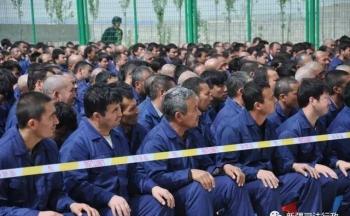UHRP calls upon the international community to condemn internment camps on International Day of the Victims of Enforced Disappearances

For immediate release
August 29, 2018 5:00 pm EST
Contact: Uyghur Human Rights Project +1 (202) 478 1920
On the International Day of the Victims of Enforced Disappearances, the Uyghur Human Rights Project (UHRP) urges attention to the ongoing human rights crisis in East Turkestan. Approximately ten percent of the Uyghur population, along with large numbers of individuals from other ethnic minority communities, have been extra judicially detained in a large-scale system of internment camps scattered across East Turkestan.
According to the International Convention for the Protection of All Persons from Enforced Disappearance, enforced disappearance is “the arrest, detention, abduction or any other form of deprivation of liberty by agents of the State or by persons or groups of persons acting with the authorization, support or acquiescence of the State, followed by a refusal to acknowledge the deprivation of liberty or by concealment of the fate or whereabouts of the disappeared person, which place such a person outside the protection of the law.” By this definition, Uyghurs detained in the camps are the victims of the largest scale enforced disappearance campaign currently occurring in the world.
UHRP’s recent report on the issue, entitled The Mass Internment of Uyghurs: “We want to be respected as humans. Is it too much to ask?” discusses the emergence of this system of internment camps and details accounts of the conditions within them, as well as the effects on the family members of those detained. Over the past year and a half the indoctrination campaign which had been ongoing in the region has escalated into a system of indefinite detention.
Those interned in these camps have been “disappeared,” as a result of the detention occurring outside of current Chinese law. While recent laws such as the national level Counter-terrorism law allow for detention for up to 15 days for infractions that do not rise to the level of a crime, some individuals have been imprisoned in these camps for months, and some for over a year. As one Uyghur individual told Radio Free Asia, “Many were told they would only be at the camps ‘studying’ for 15 days, but that was a big lie.”
Those detained in the camps are reportedly moved around to different facilities without their family members being informed. For Uyghurs in the diaspora, their family members have truly disappeared. They cannot contact their relatives while overseas without putting them in great danger. Many have family and friends in the camps, often due to the fact that they live abroad.
Due to the unprecedented scale and nature of these disappearances, more and more Uyghurs in the diaspora are speaking out. While many were once reluctant to voice their concerns, many are now concluding that an apolitical stance has not helped their relatives. One woman, quoted in UHRP’s report states “I have kept silent before but now I realize it is not useful to be silent. Now I am ready to speak up on behalf of my daughter. Whoever asks, wherever I am required to go, I’ll speak up about my daughter’s disappearance.” Another, Habibe Omer, says “China is denying that there is a thing called internment camps. In fact, they exist. They are lying. I personally know and can testify that my direct relatives and people I know have been interned in camps and they are still there. I don’t know what is happening to them and there is no news about them.”
The Chinese government is attempting to obfuscate the existence and nature of the camps. At first officials denied the reality of the camps, as did one official stationed in Kazakhstan. As the review of China’s implementation of the Convention on the Elimination of All Forms of Racial Discrimination drew more attention to the existence of the camps, the official Chinese response shifted towards framing them as “vocational training” for “criminals” or to compare them to the de-radicalization programs that exist in countries with stronger adherence to the rule of law and respect for civil rights.
UHRP calls upon the international community to condemn these camps and demand the release of all individuals in them who are being held without charge. The international community should demand the immediate release of those detained in the camps, and in the event the detentions continue signal disapproval through sanctioning responsible officials through a Global Magnitsky Act.
Further reading:
“The Mass Internment of Uyghurs: ‘We want to be respected as humans. Is it too much to ask?'”: https://docs.uhrp.org/pdf/MassDetention_of_Uyghurs.pdf
International Convention for the Protection of All Persons from Enforced Disappearance https://www.ohchr.org/EN/ProfessionalInterest/Pages/IntConventionEnforcedDisappearance.aspx
